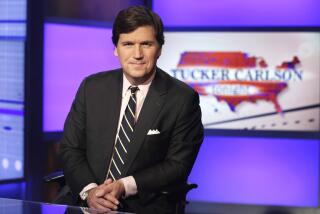Apparently Reluctant Bush Has Meeting With Yeltsin
WASHINGTON — An apparently reluctant President Bush met for 15 minutes Tuesday with Soviet political maverick but the critic of Kremlin leader Mikhail S. Gorbachev was allowed no exposure and little chance to voice his complaints from the White House.
“The President emphasized . . . his hope for the success of the reform movement in the Soviet Union,” a short White House statement said after the meeting. Bush also said his Administration enjoys “a very positive relationship” with Gorbachev, according to the statement.
As for Yeltsin, the statement said only that he “evaluated the progress of perestroika, “ referring to political and economic reforms championed by Gorbachev.
However, after a later meeting with Secretary of State James A. Baker III, Yeltsin said he had presented Bush with “a list of 10 issues which could be discussed between us which would serve to rescue perestroika. “ He did not elaborate, but the State Department said he wants U.S. investments, not grants of economic aid, to help perestroika reforms.
Equivocating for Days
The White House only acceded to the Yeltsin visit at the last minute after equivocating for days. Leaning over so as not to embarrass Gorbachev, the White House staged the Bush meeting with Yeltsin in the office of Bush’s national security adviser, Brent A. Scowcroft, rather than in the Oval Office.
Bush ostensibly “dropped in” on Scowcroft’s talk with Yeltsin on his way to another appointment, an official said. Vice President Dan Quayle also “dropped by,” further diluting the event. No news photographers were permitted to record the meeting.
Justifying White House actions, presidential spokesman Marlin Fitzwater said Bush did not want to “provide (Yeltsin with) a platform for dissent. . . . We don’t want to do anything to foster internal conflict that might be associated with this trip.”
(In another U.S.-Soviet matter, Fitzwater dismissed complaints Monday by Soviet Foreign Minister Eduard A. Shevardnadze that the Bush Administration is dragging its feet on the strategic arms reduction talks in Geneva. “The Shevardnadze statement is mystifying in the sense we have felt the negotiations were going ahead rather well,” Fitzwater added.)
Yeltsin, 58, is the most popular and visible leader of the embryonic political opposition in the Soviet Parliament. A bluff, gregarious Siberian with a broad smile, he is commonly called a populist, although he objects to the description because of its demagogic connotation.
He was dismissed as chief of the Communist Party in Moscow and ousted from the Politburo two years ago after outspoken public attacks on the special privileges accorded Kremlin leaders and more muted criticism of Gorbachev and his wife, Raisa. But he was elected overwhelmingly earlier this year as a Moscow representative to the Congress of People’s Deputies in the first contested Soviet election in more than six decades.
More to Read
Get the L.A. Times Politics newsletter
Deeply reported insights into legislation, politics and policy from Sacramento, Washington and beyond. In your inbox three times per week.
You may occasionally receive promotional content from the Los Angeles Times.










